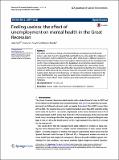Por favor, use este identificador para citar o enlazar a este item:
http://hdl.handle.net/10261/170378COMPARTIR / EXPORTAR:
 SHARE SHARE
 CORE
BASE CORE
BASE
|
|
| Visualizar otros formatos: MARC | Dublin Core | RDF | ORE | MODS | METS | DIDL | DATACITE | |

| Campo DC | Valor | Lengua/Idioma |
|---|---|---|
| dc.contributor.author | Farré, Lídia | - |
| dc.contributor.author | Fasani, Francesco | - |
| dc.contributor.author | Mueller, Hannes | - |
| dc.date.accessioned | 2018-09-30T03:56:12Z | - |
| dc.date.available | 2018-09-30T03:56:12Z | - |
| dc.date.issued | 2018-09-27 | - |
| dc.identifier.citation | IZA journal of labor economics 7(1): 8 (2018) | - |
| dc.identifier.issn | 2193-8997 | - |
| dc.identifier.uri | http://hdl.handle.net/10261/170378 | - |
| dc.description.abstract | This article documents a strong connection between unemployment and mental distress using data from the Spanish National Health Survey. We exploit the collapse of the construction sector to identify the causal effect of job losses in different segments of the Spanish labor market. Our results suggest that an increase of the unemployment rate by 10 percentage points due to the breakdown in construction raised reported poor health and mental disorders in the affected population by 3 percentage points, respectively. We argue that the size of this effect responds to the fact that the construction sector was at the center of the economic recession. As a result, workers exposed to the negative labor demand shock faced very low chances of re-entering employment. We show that this led to long unemployment spells, stress, hopelessness, and feelings of uselessness. These effects point towards a potential channel for unemployment hysteresis. | - |
| dc.description.sponsorship | We acknowledge financial support from the RecerCaixa programme 2012. The funds allowed the collection of data. It also financed a research assistant to clean the data and conduct the preliminary analysis. Hannes Mueller acknowledges financial support from the Ramon y Cajal programme and Spanish Ministry of Economy and Competitiveness, through the Severo Ochoa Programme for Centres of Excellence in R&D (SEV-2011-0075). Farré acknowledges the financial support of the Government of Catalonia (grant SGR2014-325) and the Spanish Ministry of Science (grant ECO2014-59959-P). These funds were used to finance the researchers to conduct the data analysis and the writing of the manuscript. | - |
| dc.publisher | Springer Nature | - |
| dc.relation | info:eu-repo/grantAgreement/MINECO/Plan Estatal de Investigación Científica y Técnica y de Innovación 2013-2016/ECO2014-59959-P | - |
| dc.relation.isversionof | Publisher's version | - |
| dc.rights | openAccess | - |
| dc.subject | Mental health | - |
| dc.subject | Great recession | - |
| dc.subject | Unemployment | - |
| dc.subject | Hysteresis | - |
| dc.title | Feeling useless: the effect of unemployment on mental health in the great recession | - |
| dc.type | artículo | - |
| dc.identifier.doi | 10.1186/s40172-018-0068-5 | - |
| dc.description.peerreviewed | Peer reviewed | - |
| dc.relation.publisherversion | https://doi.org/10.1186/s40172-018-0068-5 | - |
| dc.date.updated | 2018-09-30T03:56:12Z | - |
| dc.language.rfc3066 | en | - |
| dc.rights.license | http://creativecommons.org/licenses/by/4.0/ | - |
| dc.contributor.funder | Ministerio de Economía y Competitividad (España) | - |
| dc.contributor.funder | Generalitat de Catalunya | - |
| dc.contributor.funder | Fundación la Caixa | - |
| dc.relation.csic | Sí | - |
| dc.identifier.funder | http://dx.doi.org/10.13039/501100002809 | es_ES |
| dc.identifier.funder | http://dx.doi.org/10.13039/501100003329 | es_ES |
| dc.type.coar | http://purl.org/coar/resource_type/c_6501 | es_ES |
| item.openairetype | artículo | - |
| item.cerifentitytype | Publications | - |
| item.grantfulltext | open | - |
| item.fulltext | With Fulltext | - |
| item.openairecristype | http://purl.org/coar/resource_type/c_18cf | - |
| Aparece en las colecciones: | (IAE) Artículos | |
Ficheros en este ítem:
| Fichero | Descripción | Tamaño | Formato | |
|---|---|---|---|---|
| feeling_recession_2018.pdf | 1,21 MB | Adobe PDF |  Visualizar/Abrir |
CORE Recommender
SCOPUSTM
Citations
69
checked on 18-may-2024
Page view(s)
434
checked on 22-may-2024
Download(s)
254
checked on 22-may-2024
Google ScholarTM
Check
Altmetric
Altmetric
Este item está licenciado bajo una Licencia Creative Commons

